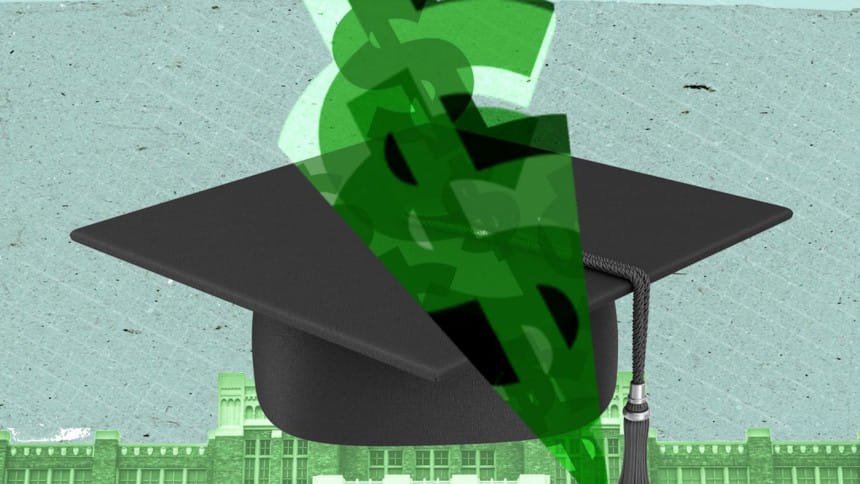Covid-19 pandemic and the economics of higher education

Money can't buy knowledge, but the knowledge industry of the modern world, centred in our universities, runs on money. Universities worldwide are money-strapped now. The pandemic has done them in. I used to believe that economics leans more toward ethics than money, so the connection between education and money is marginal. I was coaxed into such an assumption having read the lecture delivered by professor Amartya Sen at the University of British Columbia, Canada, when the university celebrated the 40th anniversary of its Interdisciplinary Graduate Programmes in 2011. Professor Sen claims that one of the founders of modern economics, Adam Smith, was a professor of moral philosophy at the University of Glasgow. Professor Smith ventured into economics with his profound philosophical knowledge to establish the connection between economics and ethics. Professor Sen seems deeply influenced by the work of Adam Smith, and I'm somewhat influenced by professor Sen. As the pandemic hit education hard, ironically, I found Anthon Chekhov more influential than professor Sen when he wrote, "Money, like vodka, does strange things to a man."
Money does strange things to a woman, too! The president of Brown University, USA, professor Christina Paxton, wrote an essay, "College Campuses Must Reopen in the Fall. Here's How We Do It," in the New York Times in April 2020, in which she claims, "The reopening of college and university campuses in the fall should be a national priority." While professor Paxton sounded like a philistine to public health officials, faculty, staff, and students, who cared about health and safety, she had her followers. Some universities in the US before and after professor Paxton's article have flip-flopped between opening-again and closing-again as the cases of the coronavirus spiked in the campuses. But the tenor of her argument in the essay prioritised money, for she repeatedly reminded her readers of the importance of universities in the US economy, revenue generation, and employment. She was brazenly honest about the basic business model for most universities, which depend on tuition due twice a year at the beginning of each semester. Remaining closed for a semester means losing as much as half of the revenue. So, she wanted universities re-opened and revenue regained immediately.
Fortunately for Bangladesh, the economics of higher education seems determined by leaders, who are compassionate. For example, The Daily Star, the premier English newspaper in Bangladesh, organised a webinar on July 11, 2020, to discuss the barriers to transition from classroom to online teaching because of the pandemic. Two students and six academic leaders participated in that webinar. They identified some of the pitfalls to online education such as inadequate physical and intellectual infrastructures, students' inability to afford devices for online classes, poor technology proficiency and Internet connectivity, students' anxieties, the digital divide between well-off and not-so-well-off students, and the absence of hands-on training. Surprisingly, none of the academic leaders seemed concerned about the economic costs of not opening the universities. Public and private universities are based on different economic models in Bangladesh, as elsewhere perhaps. Private universities are self-sponsored, while the public universities are sponsored mostly by the government. Public university professionals are hardly affected by the economics of higher education in Bangladesh as such.
While private universities are accused of commodifying education in Bangladesh—and they stand guilty to some extent on that front—professor Atiqul Islam, the Vice-Chancellor of North South University, the premier private university in Bangladesh, averred in the webinar that no one's education should be stopped because of the pandemic and that private universities shouldn't pressurise students over tuition fees and enrolment. His suggestions for remedial measures (tuition reduction, fee waiver, and scholarships offering) didn't smack of money. He proposed that small private universities that might not survive without enrolling students during the upcoming semester should consider mergers to help students pursue their studies smoothly. These recommendations have ethics and empathy embedded. The economics of higher education speaks a different language here thanks to the pandemic. Saving students' lives first to educate them later in-person is the new business model for higher education.
Paul Krugman, a Nobel Laurate in Economics, calls professor Islam's stance, and the stances of that are similar to his, the "economics of not dying" in his essay "On the Economics of Not Dying" in the New York Times in May 2020. Professor Krugman argues that generating incomes for improving the quality of life is not the economy's ultimate purpose. What makes the major contribution to the quality of life is not dying, he contends. Until the pandemic, people hardly realised that universities are more vulnerable to death than humans. Fee revenues have fallen sharply; endowments and donations have shrunk; research funding has close to disappeared (with some exceptions in biological sciences); and room and board income for residential universities have all diminished. Almost all universities around the globe are in a financial fiasco. And because most courses last 4 years, a fall-off in applications during one year has lasting effects on income for the years ahead. Some universities that were already in a chronic economic crisis will not survive the slump caused by the pandemic. Before they perish, though, they will expose the "foundation of wilful ignorance" about the economics of higher education, as professor Krugman implies.
Professors Richard Arum and Josipa Roksa added further arguments to the economics of higher education in their essay "Your So-Called Education" in 2011 in the New York Times. They claim that academic investments are lower priorities these days, for universities are investing in deluxe dormitory rooms, elaborate student centres, and expensive gyms. In order for that to happen, universities have taken on staggering amounts of debt to expand their physical plant. The economic viability of so many universities is determined by what happens out of the classroom. Now that the universities are physically closed and the social side of the universities is altogether missing, spiralling tuition and other fees that far outpaced the rate of inflation have stopped rolling in. Universities are in a disarray. If the pandemic lingers, the crisis will exacerbate. As a consequence, some universities will crumble, not because they've exhausted their utilities, but because they were built on a flawed economic model.
Fixing such a flawed model of economics in modern universities warrants considering the complex ecosystems that besiege universities these days. Anthropologist David Graeber deplores the "bullshitisation of real jobs" in universities in Bullshit Jobs. From 1985 to 2005, Graeber notes—from Benjamin Ginsberg's The Fall of the Faculty—students and faculty populations at American universities increased by 50 percent, while administration increased by 85 percent, and the number of administrative staff increased by 240 percent. Since 2005, universities around the globe seem to have evolved further along that line by adding more bullshit jobs. Why do universities need coaches, local and global advisors, brand ambassadors, ranking consultants, legal advisors, public relations bureaucrats, and equity fund managers? These sharks gut the coffers of universities built by faculty. Where are they now, when the universities they've leeched face an existential threat? The pandemic exposes that universities serve people who can't serve universities, because they're nimrods. They've skewed the economics of universities to mire them in what Graeber calls "managerial feudalism."
So, faculty governance in universities erodes and administrative bloat increases. Universities gradually shift away from teaching, research, and community service into extraction and embezzlement. Greed, insensitivity, and cruelty underpin the economics of universities. In Bangladesh—as elsewhere, private universities are more vulnerable to these vagaries than the public ones. Besides a handful of faculty (fortunately I fall in that bracket!), most private universities in Bangladesh have laid off and furloughed faculty and staff along with reducing salary and withholding benefits to weather the pandemic. Because the pandemic has upended the economics of the universities, where would the money come from to sustain the faculty and staff at full throttle? Some universities ask this wrong question to justify their economic mismanagement. The right question is: Where did the money go?
I would like to conclude with a personal note. I enrolled at a public university in Bangladesh in the mid-90s to pursue a Bachelor's and a Master's in English literature. I paid Tk 120 (USD 1.42) as tuition for a year. At the end of the year, I was informed that I was awarded a merit scholarship for three years from the board I was affiliated with. The university refunded my tuition along with a stipend every year. When I recall this these days, an infinite sense of gratitude overcomes me. I feel indebted and patriotic. I wonder what my feeling would be like if I had to pay Tk 10,00,000 (USD 11,795) for my Bachelor's and the same amount for my Master's.
Economics critically determines ethics, emotion, and civic engagement of the students universities serve. The pandemic urges us to revamp all three.
Mohammad Shamsuzzaman is an assistant professor, Department of English and Modern Languages, North South University, Bangladesh.
E-mail: [email protected]

 For all latest news, follow The Daily Star's Google News channel.
For all latest news, follow The Daily Star's Google News channel. 



Comments